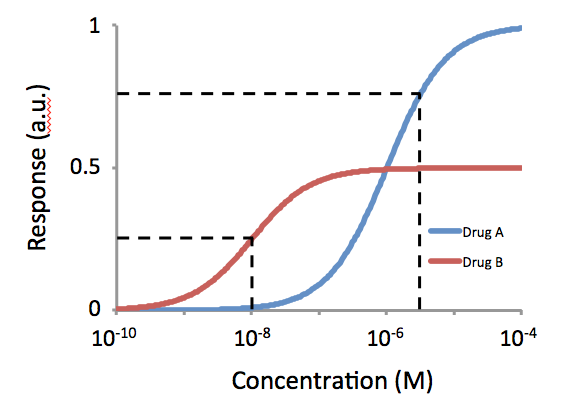Potency (pharmacology) on:
[Wikipedia]
[Google]
[Amazon]
 In
In
 In
In pharmacology
Pharmacology is the science of drugs and medications, including a substance's origin, composition, pharmacokinetics, pharmacodynamics, therapeutic use, and toxicology. More specifically, it is the study of the interactions that occur betwee ...
, potency or biological potency is a measure of a drug's biological activity
In pharmacology, biological activity or pharmacological activity describes the beneficial or adverse effects of a drug on living matter. When a drug is a complex chemical mixture, this activity is exerted by the substance's active ingredient or ...
expressed in terms of the dose required to produce a pharmacological effect of given intensity. A highly potent drug (e.g., fentanyl
Fentanyl is a highly potent synthetic piperidine opioid primarily used as an analgesic (pain medication). It is 30 to 50 times more Potency (pharmacology), potent than heroin and 50 to 100 times more potent than morphine. Its primary Medici ...
, clonazepam, risperidone
Risperidone, sold under the brand name Risperdal among others, is an atypical antipsychotic used to treat schizophrenia and bipolar disorder, as well as aggressive and self-injurious behaviors associated with autism spectrum disorder. It is t ...
, benperidol, bumetanide) evokes a given response at low concentrations, while a drug of lower potency (e.g. morphine
Morphine, formerly also called morphia, is an opiate that is found naturally in opium, a dark brown resin produced by drying the latex of opium poppies (''Papaver somniferum''). It is mainly used as an analgesic (pain medication). There are ...
, alprazolam, ziprasidone, haloperidol, furosemide) evokes the same response only at higher concentrations. Higher potency does not necessarily mean greater effectiveness
Effectiveness or effectivity is the capability of producing a desired result or the ability to produce desired output. When something is deemed effective, it means it has an intended or expected outcome, or produces a deep, vivid impression.
Et ...
nor more side effects
In medicine, a side effect is an effect of the use of a medicinal drug or other treatment, usually adverse but sometimes beneficial, that is unintended. Herbal and traditional medicines also have side effects.
A drug or procedure usually used ...
nor less side effects.
Types of potency
The International Union of Basic and Clinical Pharmacology (IUPHAR) has stated that "potency is an imprecise term that should always be further defined", and lists of types of potency as follows:Miscellaneous
Lysergic acid diethylamide (LSD) is one of the most potentpsychoactive drug
A psychoactive drug, psychopharmaceutical, mind-altering drug, consciousness-altering drug, psychoactive substance, or psychotropic substance is a chemical substance that alters psychological functioning by modulating central nervous system acti ...
s known, with effects occurring at doses of as low as 20μg.
See also
* Reaction inhibitor § PotencyReferences
Further reading
* * * * {{Pharmacology Pharmacodynamics